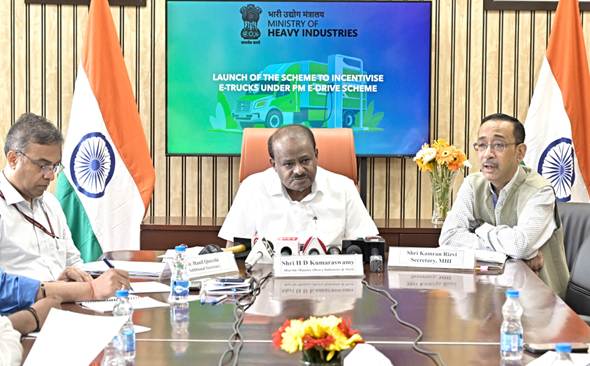India Rolls Out First-Ever e-Truck Incentive Scheme Under PM Modi’s Green Mobility Vision

IN NEWS
India Rolls Out First-Ever e-Truck Incentive Scheme Under PM Modi’s Green Mobility Vision
ANALYSIS
1. Context
- The Ministry of Heavy Industries (MHI), under the guidance of Union Minister H.D. Kumaraswamy, launched India’s first-ever incentive scheme for electric trucks under the PM E-DRIVE initiative.
- This marks the first direct government support specifically targeted at the electrification of freight mobility.
2. Rationale Behind the Scheme
- Diesel trucks constitute only 3% of India’s vehicle population but contribute 42% of transport-related GHG emissions, significantly impacting air quality.
- The initiative aligns with national goals including Viksit Bharat 2047 and the net-zero target by 2070.
3. Coverage Under the Scheme
- Incentives apply to N2 and N3 category electric trucksunder CMVR.
- N2 Category: GVW above 3.5 tonnes and up to 12 tonnes.
- N3 Category: GVW above 12 tonnes and up to 55 tonnes.
- For articulated vehicles, incentives apply only to the puller tractor of the N3 category.
4. Warranty Requirements
- Battery Warranty: 5 years or 5 lakh km, whichever is earlier.
- Vehicle & Motor Warranty: 5 years or 2.5 lakh km, whichever is earlier.
- These conditions ensure performance reliability and robust manufacturer accountability.
5. Incentive Structure
- Incentives vary according to GVW.
- Maximum incentive: ₹9.6 lakh per vehicle.
- Incentives serve as an upfront purchase price reduction and are reimbursed to OEMs through the PM E-DRIVE portal, on a first-come, first-served basis.
6. Expected Deployment
- The scheme aims to support approximately 5,600 e-trucks nationwide.
- A targeted provision includes 1,100 e-trucks for Delhi with an outlay of ₹100 crore to address severe pollution levels in the capital.
7. Beneficiary Sectors
- Key industrial and logistics sectors likely to benefit include:
- Cement
- Ports
- Steel
- Broader logistics and supply chain operations
- Major OEMs such as Volvo Eicher, Tata Motors, and Ashok Leyland are already manufacturing electric trucks in India, strengthening domestic capacity.
8. Institutional Adoption
- SAIL has committed to procuring 150 e-trucks over the next two years.
- It has additionally set a target to make 15% of all hired vehicles electric across its units.
9. Mandatory Scrappage Clause
- Eligibility for incentive requires scrapping of old, polluting trucks, thereby combining fleet modernisation with emission reduction.
10. Broader National Impact
- Supports the creation of a self-reliant electric mobility ecosystem.
- Expected to reduce logistics costs, enhance air quality, and expedite India’s transition towards a low-carbon freight system.
STATIC PORTION (EXAM-RELEVANT)
CMVR Classification (Relevant Categories)
- N2 Vehicles:
- Motor vehicles for goods transport with GVW > 3.5 tonnes and ≤ 12 tonnes.
- N3 Vehicles:
- Motor vehicles for goods transport with GVW > 12 tonnes (up to 55 tonnes as per scheme applicability).
- Articulated Vehicles:
- Incentives apply only to the puller tractor of N3 category trucks.
About PM E-DRIVE
- A government initiative aimed at speeding up electric vehicle adoption across sectors, especially commercial and heavy-duty vehicles.
- Functions as an integrated platform for approvals, reimbursement, and monitoring of electric mobility schemes.
Updated – 11 Jul 2025 ; 3:27 PM | PIB
News Source:PIB